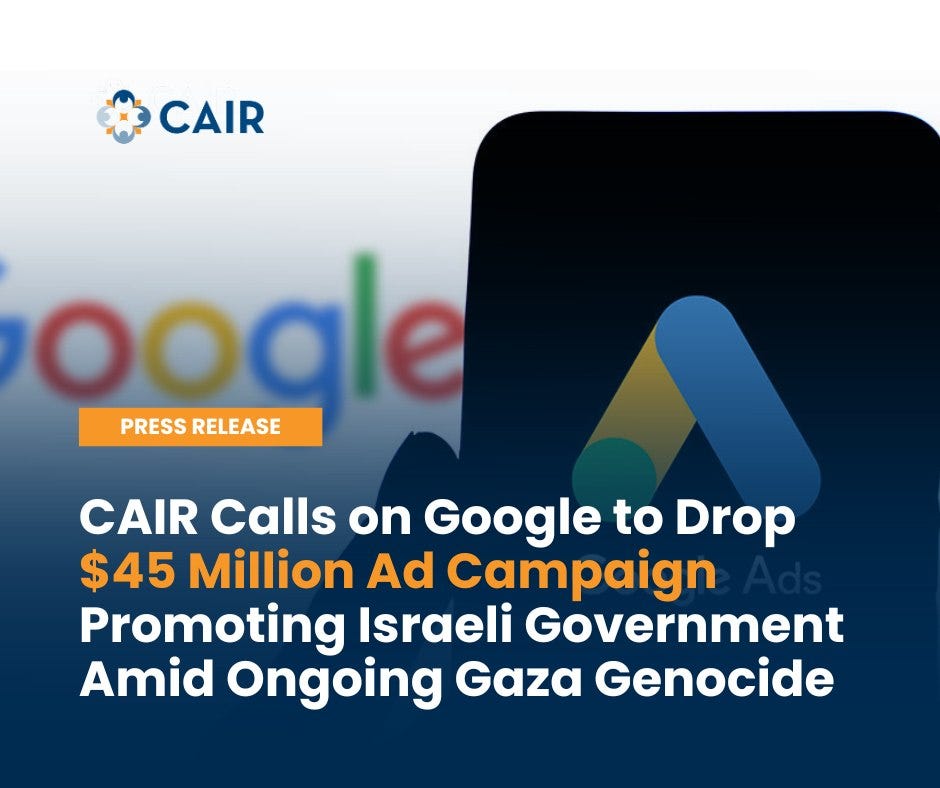Muslim Rights Group Challenges Google's $45 Million Israeli Ad Campaign
Civil Rights Group Confronts Google's Role in Promoting Israeli Government Messaging During Humanitarian Crisis
The Council on American-Islamic Relations (CAIR) on Wednesday called on Google to immediately cancel a reported $45 million advertising contract with Israeli Prime Minister Benjamin Netanyahu's office, escalating concerns over the tech giant's role in promoting Israeli government narratives during the ongoing Gaza conflict. The campaign, which has generated over 6 million views for content denying starvation in Gaza, represents one of the most considerable digital propaganda efforts targeting the humanitarian crisis.
"Microsoft must not allow itself and its stockholders to be complicit in Israel's genocide in Gaza" - CAIR statement on tech companies' involvement
Breaking Down the Digital Battlefield
According to a report by Drop Site News published Tuesday, Google entered into a six-month contract in late June, describing itself as a "key entity" in supporting Netanyahu's public relations strategy. The campaign coincided with Israel's blockade of food, medicine, fuel, and other humanitarian supplies to Gaza beginning March 2, 2025.
The advertising blitz includes YouTube videos from Israel's Foreign Ministry declaring "there is food in Gaza. Any other claim is a lie," which has garnered more than 6 million views through paid promotion. Government documents characterize these efforts as "hasbara," a Hebrew term often translated as propaganda.
Beyond Google, Israeli government records show spending $3 million on ads with X (formerly Twitter) and $2.1 million with French-Israeli platform Outbrain/Teads.
CAIR's Growing Pressure Campaign
CAIR's demand represents the latest escalation in a broader campaign targeting tech companies' involvement in the conflict in Gaza. Last month, CAIR and its Washington state chapter called on Microsoft to deny Israel's use of its servers, citing reports that the company's Azure cloud system stores surveillance data used to identify bombing targets in Gaza.
"With each passing day, the revelations emanating from just how deeply entrenched tech-giants are in the ongoing genocide are truly shocking," said CAIR-WA Executive Director Imraan Siddiqi.
The civil rights organization has increasingly focused on corporate accountability as international criticism mounts over the humanitarian situation in Gaza. CAIR's mission includes protecting civil rights and promoting justice for American Muslims and other communities.
Humanitarian Crisis Contradicts Ad Campaign
The advertising campaign directly contradicts mounting evidence of Gaza's deteriorating humanitarian situation. The UN formally declared a famine in the Gaza governorate in August, with the Integrated Food Security Phase Classification projecting famine conditions would spread to Deir al-Balah and Khan Younis.
The Gaza Health Ministry reported that 185 people, including 12 children, died of starvation in August alone—the highest monthly figure since the conflict began. Health officials documented more than 43,000 children under age five suffering from malnutrition alongside 55,000 pregnant and breastfeeding women.
"This Famine is entirely man-made, it can be halted and reversed" - UN Integrated Food Security Phase Classification
At least 367 Palestinians, including 131 children, have died from hunger and malnutrition since the war began, according to Gaza's health ministry.
Tech Giants Under Scrutiny
Google's involvement extends beyond the current campaign. The company has previously faced criticism for allowing Israeli government ads targeting UNRWA, the UN's relief agency for Palestinian refugees. A WIRED investigation found Israeli ads appeared 44% of the time when users searched UNRWA-related terms, compared to just 34% for UNRWA USA's own ads.
UNRWA Commissioner-General Philippe Lazzarini accused Israel of "buying ads on Google to block users from giving donations" to the agency, calling the misinformation campaign a weapon of war.
Several current and former Google employees have complained internally about Israel's advertising campaigns, according to WIRED, highlighting tensions within the company over its policies regarding political advertising and misinformation.
Corporate Accountability Challenges
The controversy raises broader questions about the responsibilities of tech companies during times of international conflict. While Google has policies against violent imagery and misleading content, critics argue the company's enforcement remains inconsistent when dealing with government advertisers.
As international pressure mounts over Gaza's humanitarian crisis, CAIR's campaign represents a growing movement to hold corporations accountable for their role in conflicts. The organization's focus on Google follows similar pressure campaigns targeting the contracts and services of other tech giants that support Israeli military operations.
The outcome of CAIR's demand could set important precedents for how major technology platforms handle government advertising during active conflicts, particularly when humanitarian organizations dispute the claims being advertised. With the Gaza crisis showing no signs of resolution, the pressure on corporate America to take sides continues to intensify.



